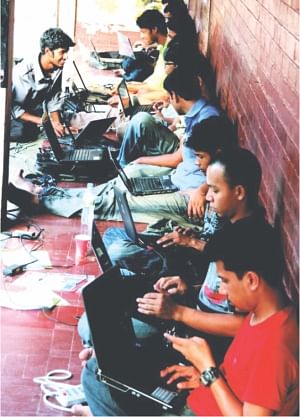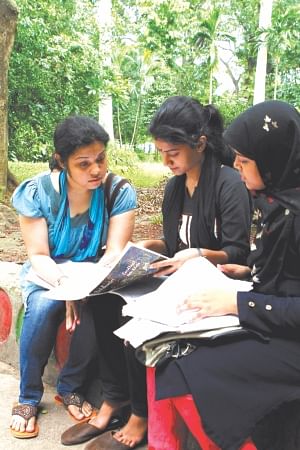| Home - Back Issues - The Team - Contact Us |
 |
| Volume 11 |Issue 20| May 18, 2012 | |
|
|
Education Banking on the Future Funding higher education is a big headache for parents or students who intend to self-finance their studies. Recently many banks have introduced schemes to help students with educational funding. Sharmin Ahmed
Saad-e-Hamid was accepted to a top university abroad for his masters. However, he could not afford to finance his education and had to wait for the University to offer him a scholarship. In the mean time, he was offered a relatively well paying job. Saad would have preferred the master's programme over a job, but he didn't know how to fund it. His father being a retired pensioner did not have sufficient funds to support him. He was, thus, compelled to take the job. He had to put off studies to earn a living. Saad-e-Hamid feels like a tragic prey of the poverty trap. "Only if I could bank on my father's funds, I could have gone off to pursue higher education.” While Saad is now happily married and has built a successful career, in a corner of his heart there still remains a regret that becomes a lingering fear as he thinks about his children: what if his children face the same situation as he did? Saad apprehensively says, "I am earning enough for now and managing to make a small saving; however, as the cost of everything continues to go up at a faster pace, who is to say I can pay for their higher education?" This is a fear shared by many parents; the cost of education, like any other service, tends to increase with time, especially if it is education abroad which requires students to finance their cost of living as well as their tuition fees.
In Bangladesh, there are provisions to take out loans to finance higher education. In order to apply, the student must provide a copy of the college/university's admission paper and proof of formal acceptance along with other documents. Once the bank decides to provide the loan, in case of a unsecured loan, they require the details of a guarantor who will take responsibility of the student's liabilities should s/he fail to pay back the loan. In case of a secured loan, they ask for the sponsor's bank statements for the last three months. A loan that should be paid within a year can be deferred up to 48 months. Nonetheless, student loans are more often than not a financial burden. After the student graduates, they are expected to get a well-paying job to pay back their loan, but as time passes, the interest begins to spiral upwards. Nadeem Chowdhury, had to come back from the US with a huge loan burden, because his visa had expired and he could not find a good job. Eventually, in order to pay for the loan along with the monstrous interest that had accumulated, he had to sell off his family's only piece of land. Nadeem says, “Costs of education and living in a reputed university in the USA can be as high as $54,000 a year. It usually takes two years to complete a Master's degree and four years to complete a Bachelors course; the rest of the calculation I leave to you.”
A few banks have recognised that people often need a way to build funds for their children's higher education in the future; as such, they have devised a scheme for parents and students. Almost all private banks now provide such schemes in the form of Deposit Pension Schemes (DPS). As Samir Mahbub, branch sales and service officer at BRAC Bank, Uttara, says, "We call it a Dream Planner Scheme (DPS), a monthly instalment basis savings plan that adds value to your hard earned money." He explains that all one needs is a savings account or a current account with the bank. One can open a DPS account with a Monthly Instalment Amount also termed as AFN ranging from Tk 1,000 to Tk 7,000. In addition, one can choose between three schemes with a maturity period of two, three and four years.
Moreover, one can take as much as 90 percent of the maturity amount as a student loan. As Samir explains, "So say you have started with Tk 7,000. You can, in four years, have as much Tk 415,000 and with a 90 percent loan which will amount to Tk 373,500, you can get in total a sum of Tk 788,500. One can invest in more than one DPS scheme or open a DPS after the maturity of one and accumulate funds.” As a result, by the time your child is ready for higher studies, there would be sufficient funds available. Almost all local banks have such dream-building schemes. Take Dhaka Bank's education savings plan for parents for school going children, for example, which includes life insurance coverage for either parent. Other forms of schemes include the Smart deposit and Children's deposit whereas the Hongkong and Shanghai Banking Corporation Limited HSBC offer Children's Saving Plans and Education Saving Plans. Education loans are also available; the difference usually lies in the rate of interest. Nonetheless, these schemes are a way to relax for most parents who want to bank on their child's future. DPS Schemes Feature:
|
||||||||||
Copyright
(R) thedailystar.net 2012 |


